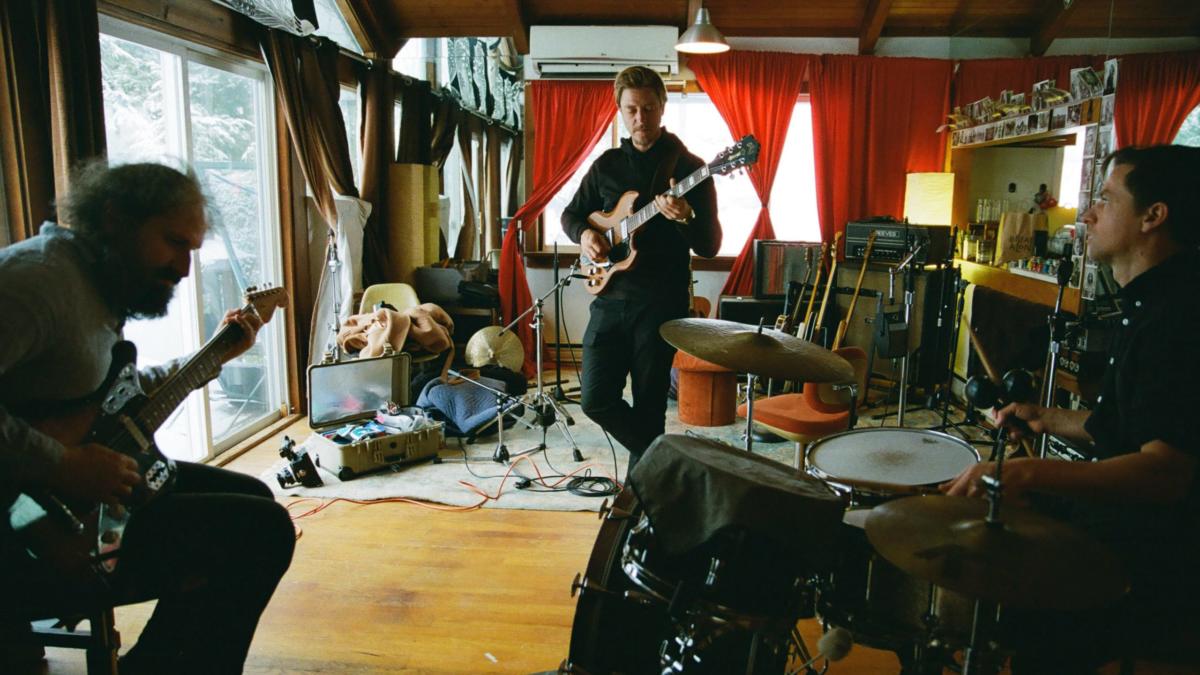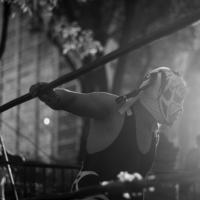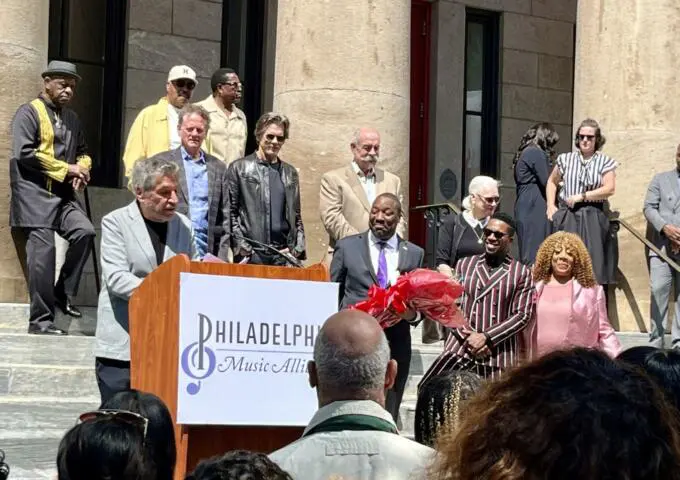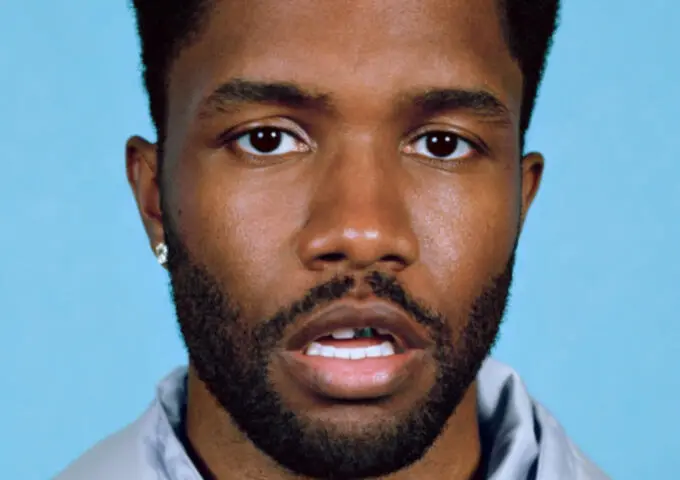Muzz is a new band composed of three guys you probably know from other bands.
Paul Banks is the singer in Interpol, has a project with The RZA called Banks + Steelz, and has released records as a solo artist. Philly-based Matt Barrick played drums for Jonathan Fire*Eater and The Walkmen, and you’ve seen him on tour with Fleet Foxes. Josh Kaufman is a third of the folk group Bonny Light Horseman and has his producer mitts all over esteemed recordings by The National, Bob Weir, The Hold Steady, The War on Drugs, and many more.
The band now is releasing its self-titled album tomorrow (June 5) on Matador.
So how did we get here? Banks and Kaufman have been friends since their formative teen years, having attended high school together overseas before separately moving to New York City for further study. There, they independently crossed paths with Barrick while running in similar music circles and shapeshifting scenes. Some years on, they each remained in touch: Barrick drummed in Banks + Steelz and on some of Kaufman’s production sessions; Kaufman helped on Banks’s early Julian Plenti solo endeavor; various demos were collaborated on; a studio in Philadelphia was co-purchased; “what if”s and “we should”s were tossed about.
When the opportunity to make music as a trio presented itself, the trio pounced.
With that level of creative chemistry in the lab, the only foreseen hold-up would be one of timing. Due to the sheer weight of the trio’s independent obligations, the Muzz project took shape at a simmer. Multiple sessions were held over the years at various practice spaces and studios like Barrick and Banks’ Silent Partner in Philadelphia and Kaufman’s preferred Isokon in Woodstock, New York, with his regular engineer Dan Goodwin filling in as co-producer on the album.
A typical session incorporated demos that Banks or Kaufman brought to the table with room in place for any member to build upon an idea as he felt, or with a new skeleton composed during a jam in the live room.
Barrick and Kaufman tended to work on music in the early parts of the days, and Banks would join them to add lyrics and melodies on top or in tandem. In a first for Banks, the lyrics were not entirely his domain, as Barrick and especially Kaufman contributed words to certain songs and helped shape things vocally. The band always recorded as they rehearsed, lending a freshness to the material that also benefited the patchwork schedule.
The resulting songs are dark and gorgeous, expansive and sparse, like Cormac McCarthy prose stretched across a cowboy painting of a sunset. “Bad Feeling” chimes and slinks with a touch of Bryan Ferry panache as Barrick’s kick drum pushes the tune along and Kaufman’s Farfisa fills the space.
“Evergreen” features Banks’s vocal doubling down on Kaufman’s slide guitar melody, and “Patchouli” and “Summer Love” burrow and twinkle psychedelically. There are upstart rockers like “Red Western Sky” and “Knuckleduster” and jazz-beat drum showcases like “How Many Days” and “All Is Dead To Me.”
PW recently caught up with Barrick to talk about the group and its new album.
How did you come up with the name Muzz?
Josh had been using that term to describe a certain quality of sound in recordings that have a warm and grainy analog texture. But that came at the tail end of a long and arduous process of trying to come up with a name!

How has the band been coping with the pandemic and all of the closures?
Like everyone else, we’ve had a ton of shows cancelled. We’re rescheduling for late fall, though it seems more and more likely that will be moved to next year. We’ve never played a show together as Muzz and were really looking forward to it. In the meantime we’re staying busy working on new music and recording some cover songs, also trying to figure out interesting ways of doing “live” versions of our songs.
Your new album is scheduled for release in early June. How did it come together, and did it turn out the way you hoped?
It’s been in the works for quite a few years. We all were busy with our other bands and projects so we’d get together in the studio a few times a year starting in early 2017, usually for about five days at a time.
While some of the songs started from demos, most of the music was written in the studio together and was recorded as we were writing it, which is a great way to work because you capture that initial excitement of an idea. We didn’t necessarily have a preconceived idea of how the band would sound – and we certainly tried many different things until we hit on sounds that we wanted to pursue – but I’m really happy with how it ended up. It was a really fun process working with these guys – and with Dan Goodwin, engineer/co-producer who had a big impact on the sound and vibe.
Muzz is three guys who had a lot of success with other bands. Was it a great fit from the start? How did you know the three of you were meant to form a band?
I loved Josh’s playing and energy from the first time we worked together, so I definitely had an interest in continuing to work with him. We got together back in 2015 and made some demos (one that ended up on the record). This was before I had become friends with Paul while playing drums with Banks and Steelz, Paul’s project with RZA. During that time, Paul and I started working on demos and at a certain point it clicked – with Paul and Josh’s friendship and history – that maybe these projects should merge.
When the three of us first got together, at a practice space in New York, we could tell there was something there, so we decided to head upstate and record a few weeks later. Once in the studio, the music flowed pretty quickly and naturally. I think the foundation of our friendships also contributed a lot to that, as well as a mutual respect of our other projects and general taste and musicianship.
The band has ties to Philly. How has the city’s music scene influenced you? Are you a fan of any local artists?
I’ve lived here for 15 years and really love the city. Last year, I opened up a recording studio in Germantown called Silent Partner (Paul is a co-owner). We’ve had some amazing people come through and I’m looking forward to when we can open our doors again! In the meantime we are navigating the world of remote sessions and thinking of ways to help Philadelphia musicians in these tough times.
The music community here is so great and diverse that I won’t even start listing names for fear of leaving someone out! I got to play one show before the shutdown with a great singer Rosali. But thinking back to the influence of Philadelphia music before I moved here from New York – definitely seeing The Roots at Wetlands in the ‘90s blew me away – Questlove drum solo on a little vintage drum kit! Lilys. I also got influenced by a lot of music from Philly when my old band The Walkmen toured with Mazarin (Quentin is a studio partner), Blood Feathers (Ben Dickey/A. M. Mills), The War On Drugs, Man Man. It always seemed like there was really cool and unusual stuff going on here.
What’s ahead for Muzz once the pandemic passes, and what are the best ways for people to stay up-to-date with what you’re doing?
We’re looking forward to playing our first show someday, and a bunch of touring. Hopefully it won’t be too long but maybe we’ll have another record by then.
The best place for Muzz info is probably instagram.com/muzztheband/.





